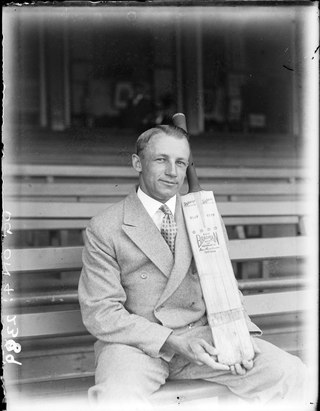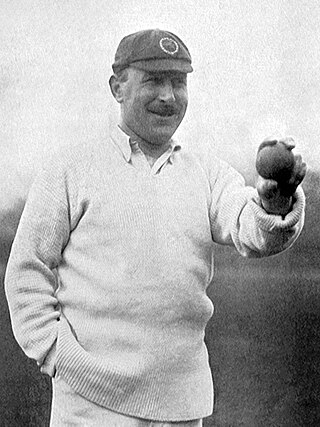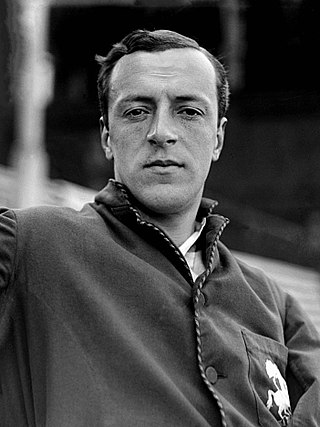Related Research Articles

William Henry Lockwood was an English Test cricketer, best known as a fast bowler and the unpredictable, occasionally devastating counterpart to the amazingly hard-working Tom Richardson for Surrey in the early County Championship. A capable enough batsman against weaker bowling sides who scored over 10,000 runs in first-class cricket, stronger bowling tended to show flaws in his technique.
Warwickshire County Cricket Club start 2005 as defending county champions and 11–4 favourites to retain their title. They play their totesport League cricket in Division Two. Warwickshire won the title in 2004 through their batting, and they have further enhanced it with the addition of Alex Loudon.
The MCC University matches in 2005 are games played between the University Centre of Cricketing Excellence ("UCCEs") and first-class opposition. This is the first year the games are called "MCC" University matches, after the MCC announced a funding plan to support the development of student cricket.
Kent County Cricket Club in 2005 played their cricket in Division One of the County Championship and Division Two of the totesport League. They started the Championship at 11–2 to win it, behind Surrey and Warwickshire. Their first first-class game, however, was against the students of Cardiff UCCE. They fell to 104 for 6 before rain prevented any further play. They had little luck in their first Sunday League game, against Derbyshire, which was also abandoned through rain.
Durham County Cricket Club started the 2005 season with odds of 20-1 to win the Second Division of the County Championship, and in one-day cricket they started the season in Division Two of the National League. However, they were promoted in both competitions - in the County Championship, they finished second after an initial run of four wins and eight matches without defeat. They only lost two of 16 Championship matches, securing promotion a week before the end of the tournament. In the National League, they were promoted with two weeks to spare, and won their last five matches - yet finished two points behind Sussex Sharks, who had a similar run. The cup competitions gave them lower final placings, however - in the C&G Trophy, they were knocked out in the first round by Derbyshire, and without internationals Mike Hussey and Paul Collingwood, who played in the NatWest Series, they lost five of eight matches in the group stages in the Twenty20 Cup to finish fifth in the North Division.
Yorkshire County Cricket Club in 2005 were in the second division of both the County Championship and the totesport League. At 6–1 odds to win the Second Division of the County Championship, they were likely to struggle again – as they had done since they won the First Division championship in 2001.
Derbyshire County Cricket Club in 2005 was the cricket season when the English club Derbyshire had been playing for one hundred and thirty-five years. They reached the semi-final in the Cheltenham and Gloucester Trophy. In the County Championship, they finished ninth in the second division and in the National League, they finished sixth in the second division. They were eliminated at group level in the North section of the Twenty20 Cup.
Surrey County Cricket Club in 2005 are playing their cricket in the First Division of the County Championship and the Second Division of the totesport League. The 2004 season was a disappointment for Surrey under the captaincy of Jonathan Batty, who was replaced by Mark Butcher for 2005. However, Butcher was out for most of the season due to an injury to his left wrist, leaving Mark Ramprakash as interim captain – one of the few, maybe the only, man to captain both Surrey and their arch-rivals Middlesex.

The Australian cricket team in England in 1948 is famous for being the only Test match side to play an entire tour of England without losing a match. This feat earned them the nickname of "The Invincibles", and they are regarded as one of the greatest cricket teams of all time. According to the Australian federal government, the team "is one of Australia's most cherished sporting legends". The team was captained by Don Bradman, who was making his fourth and final tour of England.

George Herbert Hirst was a professional English cricketer who played first-class cricket for Yorkshire County Cricket Club between 1891 and 1921, with a further appearance in 1929. One of the best all-rounders of his time, Hirst was a left arm medium-fast bowler and right-handed batsman. He played in 24 Test matches for England between 1897 and 1909, touring Australia twice. He completed the double of 1,000 runs and 100 wickets in an English cricket season 14 times, the second most of any cricketer after his contemporary and team-mate Wilfred Rhodes. One of the Wisden Cricketers of the Year for 1901, Hirst scored 36,356 runs and took 2,742 wickets in first-class cricket. In Tests, he made 790 runs and captured 59 wickets.

When the First World War ended in November 1918, thousands of Australian servicemen were in Europe as members of the First Australian Imperial Force (AIF) and many remained until the spring of 1919. In England, a new first-class cricket season was planned, the first since 1914, and an idea that came to fruition was the formation of an Australian touring side made up of servicemen. Agreement was reached with the Australian Corps HQ in London, commanded by Field Marshal William Birdwood, 1st Baron Birdwood, and the Australian Imperial Force Touring XI was formed, initially under the captaincy of pre-war Test player Charlie Kelleway. Kelleway departed after only six matches following a dispute about the fixtures list. A players' meeting elected future Test player Herbie Collins as team captain for the remainder of the tour, despite the fact that Collins' military rank was lance corporal and there were seven officers in the party. The bulk of the team remained intact for nearly nine months from May 1919, playing 33 matches in Great Britain, ten in South Africa on their way home and then another three in Australia itself before disbanding in February 1920. Of the 46 matches, 39 are adjudged first-class and the team had only four defeats, all of these in England. The players lived on their army pay and all profits from gate money went to an AIF Sports Control Board.
William Palmer was an English cricketer who played in the 1760s and 1770s. He was born and died in Coulsdon, Surrey. A top-order batsman, he was a member of the local Coulsdon Cricket Club and played county cricket for Surrey. Most of Palmer's career was before cricket's statistical record began in the 1772 season so relatively little is known of him but he regularly played in noted matches until 1776. He has been recorded in 24 eleven-a-side matches and in one top-class single wicket match. He was last recorded playing for Coulsdon against Chertsey in 1784 when he was 47 years old.

The Australian cricket team toured England during the 1902 English cricket season. The five-Test series between the two countries has been fondly remembered; in 1967 the cricket writer A. A. Thomson described the series as "a rubber more exciting than any in history except the Australia v West Indies series in 1960–61". Australia had won the previous three Test rubbers between the two countries, and now won their fourth successive series, by two matches to one with two draws. In the process they "beat the records of all their predecessors in the country" by losing only two of 39 matches during the tour, their defeats being against England in the Fifth Test and in the first of their two fixtures against Yorkshire. The remaining 37 matches gave 23 wins for Australia and 14 draws.
The New Zealand cricket team toured England in the 1949 season. The team was the fourth official touring side from New Zealand, following those in 1927, 1931 and 1937, and was by some distance the most successful to this date. The four-match Test series with England was shared, every game ending as a draw, and of 35 first-class fixtures, 14 were won, 20 drawn and only one lost.
Bill Johnston was a key member of Donald Bradman's famous Australian cricket team, which toured England in 1948. The Australians went undefeated in their 34 matches during the English summer; this unprecedented feat by a Test side touring England earned them the sobriquet The Invincibles.
James Geoffrey Lomax played first-class cricket as a right-handed batsman and right-arm fast-medium bowler for Lancashire and Somerset between 1949 and 1962. He was born at Rochdale, then in Lancashire, and died at Frenchay Hospital, near Bristol.

During the seven years 1933 to 1939, Herbert Sutcliffe played throughout the period for Yorkshire during one of the club's most successful phases. His Test career ended in 1935 but he formed a new opening partnership for Yorkshire with the young Len Hutton. In 1939, he was the first Yorkshire player to be called up for military service as the Second World War loomed.

Bernard James Tindal Bosanquet was an English cricketer best known for inventing the googly, a delivery designed to deceive the batsman. When bowled, it appears to be a leg break, but after pitching the ball turns in the opposite direction to that which is expected, behaving as an off break instead. Bosanquet, who played first-class cricket for Middlesex between 1898 and 1919, appeared in seven Test matches for England as an all-rounder. He was chosen as a Wisden Cricketer of the Year in 1905.
References
- ↑ Warner, David (2011). The Yorkshire County Cricket Club: 2011 Yearbook (113th ed.). Ilkley, Yorkshire: Great Northern Books. p. 362. ISBN 978-1-905080-85-4.